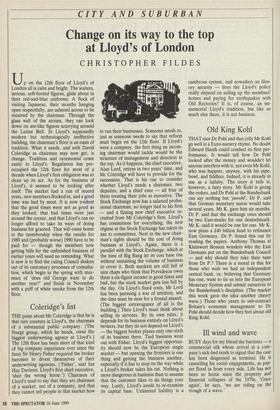Coleridge's list
THE point about Mr Coleridge is that he is that rare creature in Lloyd's, the chairman of a substantial public company. (The Sturge group, which he heads, owns the biggest underwriting agency at Lloyd's.) The 12th floor has been short of that kind of big company experience ever since the fussy Sir Henry Fisher required the broker baronies to divest themselves of their underwriting agencies. ('Fisher', said Ian Hay Davison, Lloyd's first chief executive, 'shot the wrong horse.') Chairmen of Lloyd's tend to say that they are chairmen of a market, not of a company, and that they cannot tell people in that market how
to run their businesses. Someone needs to, just as someone needs to say that reform must begin on the 12th floor. If Lloyd's were a company, the first thing an incom- ing chairman would tackle would be the structure of management and direction at the top. As it happens, the chief executive, Alan Lord, retires in two years' time, and Mr Coleridge will have to provide for the succession. That is his cue to consider whether Lloyd's needs a chairman, two deputies, and a chief exec — all four of them treating their jobs as executive. The Stock Exchange now has a salaried profes- sional chairman, no longer tied to his firm — and a fizzing new chief executive re- cruited from Mr Coleridge's firm. Lloyd's has committees for everything; the new regime at the Stock Exchange has taken its axe to committees. Next in the new chair- man's sights should be the cost of doing business at Lloyd's. Again, there is a parallel with the Stock Exchange, which at the time of Big Bang let its cost base rise without sustaining the volume of business to cover it. Both markets are still full of nice chaps who think that Providence owes them a six-figure income in good times and bad, but the stock market gets less full by the day. On Lloyd's fixed costs, Mr Lord has been pursuing a war of attrition, and the time must be near for a frontal assault. (The biggest extravagance of all is the building.) Then Lloyd's must think about selling its services. By its own rules, it depends for its business entirely on Lloyd's brokers, but they do not depend on Lloyd's — the biggest broker places only one-sixth of its business there. Tied business went out with Fisher. Lloyd's biggest opportun- ity should now be the European single market — but opening the frontiers is one thing and getting the business another, especially if it has to stop on the way while a Lloyd's broker takes his cut. Nothing is more dangerous in business than to assume that the customer likes to do things your way. Lastly, Lloyd's needs to re-examine its capital base. Unlimited liability is a
cumbrous system, and nowadays an illus- ory security — does the Lloyd's policy really depend on selling up the members' homes and paying for earthquakes with Old Rectories? It is, of course, an im- memorial Lloyd's tradition, but like so much else there, it is not business.


















































 Previous page
Previous page